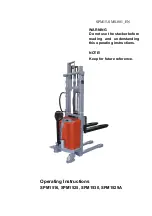
0
0
3
3
.
.
1
1
3
3
E
E
N
N
10
10
charging. Gassing is a chemical process. This gas mixture is highly explosive and
charging. Gassing is a chemical process. This gas mixture is highly explosive and
must not be ignited.
must not be ignited.
Always disconnect
Always disconnect the
the charger and
charger and truck
truck before
before connecting or
connecting or disconnecting the
disconnecting the
charger and battery.
charger and battery.
The charger must be adapted to the battery in terms of voltage, charge capacity
The charger must be adapted to the battery in terms of voltage, charge capacity
and battery technology.
and battery technology.
Before charging, check all cables and plug
Before charging, check all cables and plug connections for visible signs of damage.
connections for visible signs of damage.
Ventilate the room in which the truck is being charged.
Ventilate the room in which the truck is being charged.
Battery cell surfaces must remain exposed during charging in order to ensure
Battery cell surfaces must remain exposed during charging in order to ensure
sufficient ventilation, see truck operating instructions, chapter D, Charging the
sufficient ventilation, see truck operating instructions, chapter D, Charging the
Battery.
Battery.
Do not smoke and avoid naked flames when
Do not smoke and avoid naked flames when handling batteries.
handling batteries.
Wherever an industrial truck is parked for charging there must be no inflammable
Wherever an industrial truck is parked for charging there must be no inflammable
material or consumables capable of creating sparks within a minimum distance of
material or consumables capable of creating sparks within a minimum distance of
2 m from the truck.
2 m from the truck.
Fire protection equipment must be available.
Fire protection equipment must be available.
Do not place any metallic objects on the battery.
Do not place any metallic objects on the battery.
Always
Always follow
follow the
the safety
safety regulations
regulations of
of the
the battery
battery and
and charger
charger station
station
manufacturers.
manufacturers.
NOTE
NOTE
Charging the battery incorrectly can result in material
Charging the battery incorrectly can result in material damage.
damage.
Incorrect battery charging can result in overloading of
Incorrect battery charging can result in overloading of the electric wires and contacts,
the electric wires and contacts,
hazardous gas formation and electrolyte leakage from the cells.
hazardous gas formation and electrolyte leakage from the cells.
Always charge the battery with DC
Always charge the battery with DC current.
current.
All
All DIN
DIN 41773
41773 charging
charging procedures
procedures are
are permitted
permitted in
in the
the format
format approved
approved by
by the
the
manufacturer.
manufacturer.
Always connect the battery to a charger that is
Always connect the battery to a charger that is appropriate to the size and type of
appropriate to the size and type of
the battery.
the battery.
If necessary have the charger checked by the manufacturer's customer service
If necessary have the charger checked by the manufacturer's customer service
department for suitability.
department for suitability.
Do not exceed limit currents in the gassing area in accordance with DIN EN 50272-
Do not exceed limit currents in the gassing area in accordance with DIN EN 50272-
3.
3.
https://www.besttruckmanuals.com/
Summary of Contents for ETV 110
Page 3: ...1 1 0 0 0 0 9 9 G G B B 2 2 https www besttruckmanuals com ...
Page 5: ...0 0 9 9 0 0 3 3 G G B B 2 2 https www besttruckmanuals com ...
Page 7: ...0 0 1 1 0 0 8 8 G G B B https www besttruckmanuals com ...
Page 11: ...1 1 0 0 0 0 9 9 G G B B https www besttruckmanuals com ...
Page 13: ...0 0 5 5 0 0 6 6 G G B B https www besttruckmanuals com ...
Page 51: ...D 9 D 9 0 0 3 3 1 1 2 2 G G B B https www besttruckmanuals com ...
Page 135: ...F 19 F 19 0 0 2 2 1 1 0 0 G G B B https www besttruckmanuals com ...





























